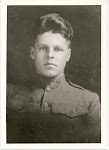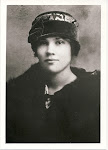December 1, 2010
France, November 30, 1918.
In this letter, his first to Stella after the armistice, Roy is exuberant, though still not optimistic about being sent home soon. As the letter goes on it becomes sober in tone; Roy begins with several positive effects of the armistice but also reveals one sad but common result of the inconstant mail service and distance from home. While he now knows where his brother is and can be more open with Stella about his experiences and his hopes to return home, he has also learned that his friend's father has been buried for a month, and though his friend's family tried to reach him it was evident from his lack of response that he had no idea his father had died.
My Dear Friend:
Well! how is Johnstown taking the peace situation by this time? I suppose the boys are beginning to return home by this time, are they not? According to the little bit of news we get here, they are mustering out the men over there very fast and are beginning to return some men from France and England. We are also hearing that the Air Service will be among the first to return, but some Squadrons will be sent on into Germany and we do not know which we will move.
We are expecting to leave this place soon and are hoping to move toward the coast. Personally I feel that I shall be lucky to get home by Easter. The censorship is not quite so rigid now, though not yet lifted, so I will tell you where we now are. We are at Bar-Le-Duc, in northwestern France. Not so many miles from Verdun, of which I suppose you have read quite a bit.
I haven't a doubt but that the folks at home are feeling very good over the end of the war, but they cannot feel any better over it than the French people who have had over four years of it and had it right at home, too.
We had quite a nice Thanksgiving dinner, even if we were in the A.E.F. I think the cooks overdid themselves that day. We had: Beefsteak and onions dressing, peas, mashed potatoes, cucumber pickles, bread, biscuits, tapioca pudding, jam tarts, syrup, butter, nuts, cigars, cigarettes, and champagne. Cocoa too. Some dinner, wasn't it? I'll say it was. And we surely did enjoy it. I am afraid it spoiled some of us as, after such a meal, it was hard for us to go back to old rations again.
I suppose you will soon be having snow over there. As usual we are having rain here. We did have a week or more of nice weather the first part of this month but are now wading mud again. And it is cold, too, very disagreeable weather.
How is the Flu Epidemic over there? I hope you have and will escape it. I know what it is like and it surely is no pleasant thing to have. I had it several weeks after we came over and though not bad, I had more of it than I cared for. Since I wrote you last I have heard from my brother over here. We have been looking for each other but neither of us could tell the other where we were but in his last letter he told me he was down near Bordeaux, so you see we are quite a distance apart.
My French is not progressing fast as I should like it to, but as long as I can use my hands I can do fairly well, Ha, Ha! You see we are too busy to learn much French. It used to be, we were working to end the war, but now we are working to get back home.
I do not know if I ever told you or not but I will tell you now about three of us boys from Claysburg enlisting together. We enlisted December 8 1917. Almost a year ago, and hoped to stick together, but were separated in Columbus, Ohio, shortly after arriving there. One of the boys I have not heard from since. The other went to Kelly Field Texas and while there wrote me several times. He is now over here, having arrived a week or two before I did. One old friend whom I met here at Behonne had seen him and gave me his address. I have written him three or four times since but have never received any reply. This evening I had a letter from his sister giving me his last address and saying they get his mail but he says he gets nothing from them. So you see the mails over here are somewhat mixed up, or something. I am going to write him again and hope to reach him this time. His sister says they buried their father October 29th and I suppose he knows nothing of it.
I think I told you in my last letter of the celebrations over the signing of the armistice. Of many other things I think I could tell you better at close range, and I hope the opportunity to do so will soon come. Anyway I'll close for this time.
Most Sincerely,
Roy D.
My Dear Friend:
Well! how is Johnstown taking the peace situation by this time? I suppose the boys are beginning to return home by this time, are they not? According to the little bit of news we get here, they are mustering out the men over there very fast and are beginning to return some men from France and England. We are also hearing that the Air Service will be among the first to return, but some Squadrons will be sent on into Germany and we do not know which we will move.
We are expecting to leave this place soon and are hoping to move toward the coast. Personally I feel that I shall be lucky to get home by Easter. The censorship is not quite so rigid now, though not yet lifted, so I will tell you where we now are. We are at Bar-Le-Duc, in northwestern France. Not so many miles from Verdun, of which I suppose you have read quite a bit.
I haven't a doubt but that the folks at home are feeling very good over the end of the war, but they cannot feel any better over it than the French people who have had over four years of it and had it right at home, too.
We had quite a nice Thanksgiving dinner, even if we were in the A.E.F. I think the cooks overdid themselves that day. We had: Beefsteak and onions dressing, peas, mashed potatoes, cucumber pickles, bread, biscuits, tapioca pudding, jam tarts, syrup, butter, nuts, cigars, cigarettes, and champagne. Cocoa too. Some dinner, wasn't it? I'll say it was. And we surely did enjoy it. I am afraid it spoiled some of us as, after such a meal, it was hard for us to go back to old rations again.
I suppose you will soon be having snow over there. As usual we are having rain here. We did have a week or more of nice weather the first part of this month but are now wading mud again. And it is cold, too, very disagreeable weather.
How is the Flu Epidemic over there? I hope you have and will escape it. I know what it is like and it surely is no pleasant thing to have. I had it several weeks after we came over and though not bad, I had more of it than I cared for. Since I wrote you last I have heard from my brother over here. We have been looking for each other but neither of us could tell the other where we were but in his last letter he told me he was down near Bordeaux, so you see we are quite a distance apart.
My French is not progressing fast as I should like it to, but as long as I can use my hands I can do fairly well, Ha, Ha! You see we are too busy to learn much French. It used to be, we were working to end the war, but now we are working to get back home.
I do not know if I ever told you or not but I will tell you now about three of us boys from Claysburg enlisting together. We enlisted December 8 1917. Almost a year ago, and hoped to stick together, but were separated in Columbus, Ohio, shortly after arriving there. One of the boys I have not heard from since. The other went to Kelly Field Texas and while there wrote me several times. He is now over here, having arrived a week or two before I did. One old friend whom I met here at Behonne had seen him and gave me his address. I have written him three or four times since but have never received any reply. This evening I had a letter from his sister giving me his last address and saying they get his mail but he says he gets nothing from them. So you see the mails over here are somewhat mixed up, or something. I am going to write him again and hope to reach him this time. His sister says they buried their father October 29th and I suppose he knows nothing of it.
I think I told you in my last letter of the celebrations over the signing of the armistice. Of many other things I think I could tell you better at close range, and I hope the opportunity to do so will soon come. Anyway I'll close for this time.
Most Sincerely,
Roy D.
Subscribe to:
Post Comments (Atom)



A very poignant letter, I think. Full of talk about people Roy wants to see, but can't. Must have been difficult to have the war over with but still not be able to be with the people he cares about.
ReplyDelete